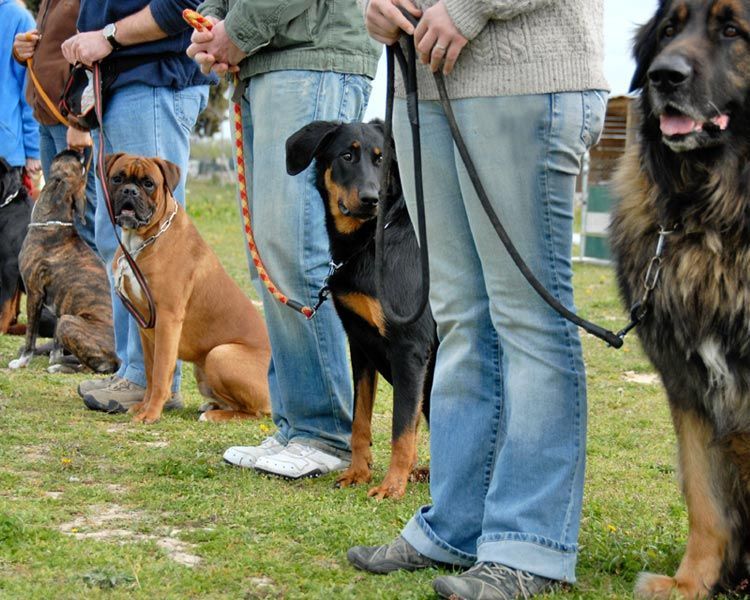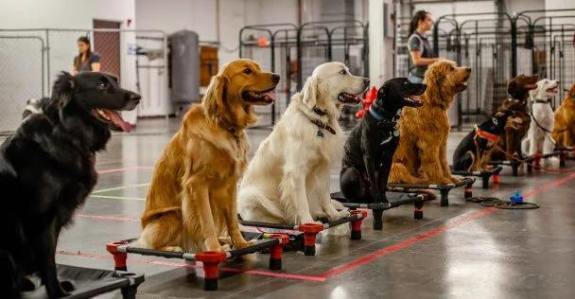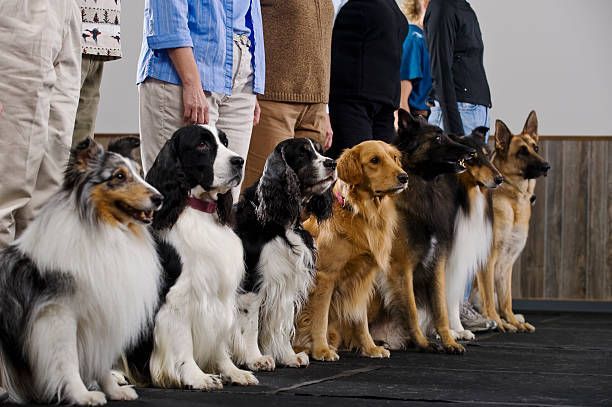Is Group Dog Obedience Training The Right Choice For My Dog?
The Benefits of Group Dog Training Classes
There is no one size fits all dog training program; every dog (as well as its owner) is unique with its own personality and individual needs. Perhaps the time has come for your canine friend to develop new behavioral skills in order to ease and strengthen their social abilities between other dogs, people, and even you. There is a lot of information regarding what type of obedience training is right for your dog and the choice typically narrows down to the preferred format of training.
Group dog training classes have many benefits for your dog. The most favored benefit is socialization! If you are wanting your dog to make some canine friends and have play time before and after class, group classes are the perfect choice for you and your dog. This is beneficial not only to your dog, but to you as a dog owner as well. Being able to relate to other dog owners and spend time with people who have similar needs to you as a dog parent can create a wonderful sense of community.
Another benefit to group dog training classes is it teaches your dog to work through distractions. When your dog joins a group training class, it is surrounded by other dogs of similar age and obedience level. Your dog is also around other adults who will most likely pay compliment to your dog, drawing in your dog’s attention. You may think this setting will provide complications to your pet’s learning, but it will actually become an invaluable experience for your dog to learn through the distractions. Your dog will be taught how to focus only on the trainer and you as its owner and develop the wonderful and coveted skill of self control.
Group training is typically a more affordable option compared to private dog training, and is therefore a more favorable selection for dog owners who are needing to stay within a budget. Because the dog trainer is training multiple dogs at once, the cost is easily spread between the participants.
Speak With A Dog
Training Expert
Speak With A Dog Training Expert
Thank you for contacting us!
We will contact you shortly!
Please try again later.

At-Home Dog Obedience Training: Misconceptions Vs Reality
While at-home dog training offers numerous benefits, there are also some common misconceptions about this approach. One misconception is that at-home training is inherently easier than group classes. While it’s true that the familiar environment of your home can make some dogs more comfortable and relaxed, at-home training also requires a high level of dedication and commitment from the owner. In a group class setting, trainers can provide crucial guidance and support throughout the training process. They can demonstrate techniques, answer questions, and troubleshoot any challenges that arise. This can be especially helpful for first-time dog owners or those unfamiliar with dog training principles. Additionally, trainers can anticipate common mistakes and proactively address them before they become ingrained habits. In contrast, at-home training places more responsibility on the owner to correctly implement the training plan and identify areas where their dog might be struggling.
Speak With A Dog
Training Expert
Speak With A Dog Training Expert
Thank you for contacting us!
We will contact you shortly!
Please try again later.
A second misconception is that dogs learn better in their own environment. There's some truth to the idea that a familiar environment can reduce stress and distractions for dogs. However, well-designed group classes offer a controlled environment with planned distractions to help dogs learn to focus and obey commands amidst various stimuli. This can be crucial for preparing a dog for the real world, where they'll encounter all sorts of sights, sounds, and smells that could potentially distract them from listening to their owner. For example, a group class might incorporate sounds like traffic noise or sirens, or introduce the dogs to other dogs or people in a structured way. At-home training can be supplemented with socialization outings to parks, dog-friendly stores, or puppy playdates to address this aspect of a dog's training.


A third misconception is that at-home training is only for basic obedience. In reality, a qualified at-home trainer can address a wide range of behavioral issues, from common problems like leash pulling and barking to more complex challenges like separation anxiety and aggression. The trainer will design a customized training plan specifically tailored to the dog's needs and the owner's goals. At-home training allows for a more in-depth exploration of the specific triggers and behaviors associated with a dog's problem, and the trainer can directly observe the dog's behavior in the environment where the problems occur.
Is There A Need For A Professional Dog Trainer?
A fourth common misconception is that any pet owner can successfully train their dog at home.
When should I avoid group dog training classes?
While group dog training classes may sound like the easiest and obvious option for you as a dog owner, there are a few pieces of information to consider before enrolling your dog. Dogs that exhibit specific behavior patterns such as being overly aggressive, reactive, or fearful are typically excluded from group classes. While your goal may be to calm these behaviors through training, there are specific foundations of behavior your dog must know before enrolling in a group class. Dogs who are unable to be consoled create stress for other dogs, their owners, as well as you!
If you are looking for your dog to develop a specific skill, such as leash control, group classes will not be beneficial to your time or money. Group dog obedience training covers a variety of skills that teach you and your dog how to act and react in situations that arise day to day. It is a responsible and well respected decision to enroll your dog into obedience training. It forms a bond between your dog and its classmates, and it enables deep trust between you and your dog. If you do opt for group dog training, understanding the benefits and making sure it is the best fit for you and your dog’s goals is the best thing you can do!
At-home dog training can be a successful option for many pet owners, but it's important to be realistic about the commitment required. Some behavioral issues, particularly those rooted in fear or aggression, may benefit from the combined expertise of a professional trainer and animal behaviorist. A qualified trainer can assess the situation and recommend the most appropriate training approach, which might involve a combination of at-home training sessions, group classes, and additional resources.
The effectiveness of at-home training hinges on three key factors: the trainer's qualifications, the owner's dedication, and the dog's individual needs. A skilled trainer can create a personalized training program that is just as effective as the programs offered at professional training facilities. Ultimately, the success of any dog training program relies on the owner's commitment to consistent practice and positive reinforcement techniques.
